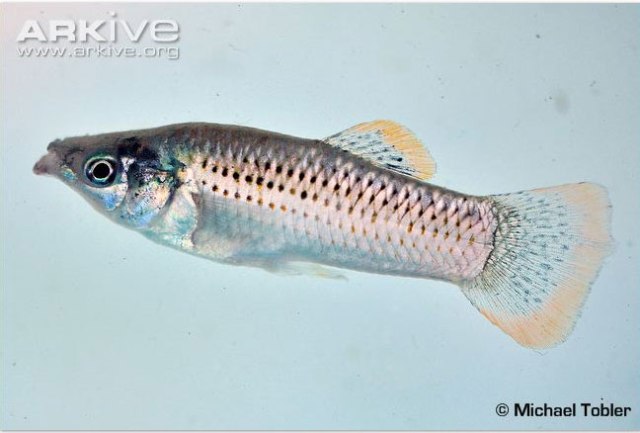Feb 10 2016
A Washington State University biologist has found the genetic mechanism that lets a fish live in toxic, acidic water. The discovery opens new insights into the functioning of other “extremophiles” and how they adapt to their challenging environments.
 A hydrogen-sulfide tolerant molly. (Photo from ARKive by Michael Tobler)
A hydrogen-sulfide tolerant molly. (Photo from ARKive by Michael Tobler)
“These fish are very extreme,” said Joanna Kelley, a genome scientist in the WSU School of Biological Sciences. “Ordinary fish, when you put them in that water, are belly up in about a minute.”
Kelley and colleagues from Kansas State University, Stanford University and Mexico’s Universidad Juárez Autónoma de Tabasco looked at the shortfin or Atlantic mollies in southern Mexico. Measuring a little more than an inch, these fish live in tropical freshwater, brackish water and volcanically influenced springs containing the acid hydrogen sulfide.
In humans, low levels of hydrogen sulfide serve as a signaling molecule that helps regulate physiological processes in the brain, heart and other organs. The work by Kelley and her colleagues may contribute to a greater understanding of how that works, with possible biomedical applications.
Working in three drainages, the researchers compared the genes expressed in three sets of hydrogen sulfide-tolerant fish and freshwater fish.
“In the freshwater system, there are 30-plus species of fish,” said Kelley. “In the sulfidic springs there’s the molly.”
Published in the journal Molecular Biology and Evolution, the research was the rare “natural experiment” in which circumstances found in nature were similar to the controlled circumstances that they would have liked in a lab, said Kelley.
“This is one of the reasons that I got excited about this – because we have this natural experiment where we can ask these questions,” she said. “It’s not just one instance that we’re looking at. We have the ability now to compare multiple instances of survival in hydrogen sulfide.”
The researchers found that about 170 of the extremophilic fish’s 35,000 or so genes were turned on, or upregulated, to detoxify and remove the hydrogen sulfide. Previous studies by other researchers in other systems have seen the same genes detoxifying hydrogen sulfide.
“It’s not that they’re keeping the hydrogen sulfide out,” said Kelley. “It’s not that they are necessarily turning on some other unrelated genes. It’s really that the genes that have been previously implicated in hydrogen sulfide detoxification are turned on or turned up. That’s really the exciting part.”
Michael Tobler, a co-investigator and assistant professor at Kansas State, said the work can help scientists project how species might adapt to other stressors.
“In these habitats, the natural pollutants give us a glimpse into the future and help us think about what happens in ecosystems that suffer from human-induced changes or pollution,” he said. “We can learn how an ecosystem changes when pollutants are added and how organisms cope with that.”
The fish can also help address questions in evolutionary development, aging research and evolutionary ecology.
“For a variety of reasons, extreme environments are a great place to study evolutionary processes,” said Kelley. “We know the selective pressure. In this case, the selective pressure is hydrogen sulfide. So we can study evolutionary processes in extreme environments in a way that we can’t when we don’t know what the selective pressure is or there are multiple subtle selective pressures.”
The research was funded by grants from the National Science Foundation (IOS-1121832, IOS-1463720) and the Army Research Office (W911NF-15-1-0175) to MT and JLK, a L’Oreal Fellowship for Women in Science to JLK, and a Ralph E. Powe Junior Faculty Enhancement Award from Oak Ridge Associated Universities to MT.